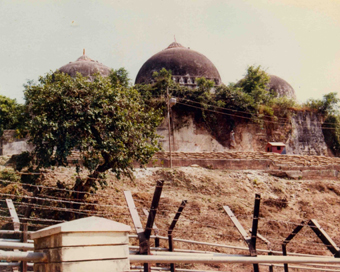 PM Modi visit USA
PM Modi visit USA Only the mirror in my washroom and phone gallery see the crazy me : Sara Khan
Only the mirror in my washroom and phone gallery see the crazy me : Sara Khan Karnataka rain fury: Photos of flooded streets, uprooted trees
Karnataka rain fury: Photos of flooded streets, uprooted trees Cannes 2022: Deepika Padukone stuns at the French Riviera in Sabyasachi outfit
Cannes 2022: Deepika Padukone stuns at the French Riviera in Sabyasachi outfit Ranbir Kapoor And Alia Bhatt's Wedding Pics - Sealed With A Kiss
Ranbir Kapoor And Alia Bhatt's Wedding Pics - Sealed With A Kiss Oscars 2022: Every Academy Award Winner
Oscars 2022: Every Academy Award Winner Shane Warne (1969-2022): Australian cricket legend's life in pictures
Shane Warne (1969-2022): Australian cricket legend's life in pictures Photos: What Russia's invasion of Ukraine looks like on the ground
Photos: What Russia's invasion of Ukraine looks like on the ground Lata Mangeshkar (1929-2022): A pictorial tribute to the 'Nightingale of India'
Lata Mangeshkar (1929-2022): A pictorial tribute to the 'Nightingale of India' PM Modi unveils 216-feet tall Statue of Equality in Hyderabad (PHOTOS)
PM Modi unveils 216-feet tall Statue of Equality in Hyderabad (PHOTOS)The Badminton Association of India (BAI) has announced a 14-member-strong India squad for
- Men’s Sr Hockey Nationals to be played in division-based format from April 4
- Mensik denies Djokovic 100th title in Miami final
- KIPG: Son of a vegetable vendor, Bihar’s Jhandu Kumar eyes Worlds, 2028 Paralympics
- Hardik Singh credits hard work and team unity for receiving HI Midfielder of the Year award
- Djokovic, Alcaraz land in same half of Miami draw
Ram Janmabhoomi SPV to build grand temple in Ayodhya: Muslims Last Updated : 23 Sep 2019 11:45:57 PM IST 
Babri Masjid. (File Photo: IANS) Ram Janmabhoomi, as a juristic personality subject to law, was a 'special purpose vehicle' (SPV) to get rid of the past structure and build a grand temple for the future, the Sunni Waqf Board told the Supreme Court on Monday during the hearing of Ayodhya title dispute.
Senior advocate Rajeev Dhavan, appearing for the Board, contended that Lord Ram's birthplace was introduced as SPV by and through the Ram Janmabhoomi Nyas (trust).
"Their main contention was to get rid of the 'shebait' (a caretaker of the deity), Nirmohi Akhara, and put the management of the temple in the socio-political hands of the Sangh Parivar," he submitted before a five-judge Constitution bench headed by Chief Justice Ranjan Gogoi.
Dhavan insisted that it seems there was a plan for "demolishing and removing the existing building".
Buttressing his arguments on challenging suit 5 filed by Devki Nandan Agarwal, who claims the title be passed on himself as the next friend of the deity, he contended the concept of birthplace was introduced as an over-riding title of the area, which is invulnerable from any competing claim of title and possession. Therefore, it will eventually ward off claims of adverse possession, defy acquisition, claim impartibility and also ward off claims of limitation.
"Such pleas were not available to the idol and the cause of action for Ram Janmabhoomi would continue until the new building was complete," he argued.
Dhavan described introducing the birthplace as a party in the lawsuit, as an over-arching entity, which is supposed to be, "embracing juristic entity both legally impregnable and invulnerable to destroy the old buildings with impunity and build a temple", as he elaborated on juristic personalities under Hindu law - self-revealed area in nature (lingams in Kailash, undulating land in Kedarnath etc.) and human created artificial idols.
He insisted that apart from belief, no part of the area (Ram Janmabhoomi) was a natural manifestation and even proof of belief was too intermittent and unreliable.
"In the present case, the next friend is not a believer, belongs to the Nyas which intends to destroy the property, build a new temple, and take over the management, excluding the shebait," Dhavan reiterated.
As Justice D.Y. Chandrachud, one of the judges on the bench, noted that Muslim witnesses have come on record stating Ram Janmabhoomi is divine to Hindus, as Makkah is divine for Muslims, Dhavan replied: "If it were to be believed Lord Ram was born there, how can the area get convert into a juristic personality?"
Justice S.A. Bobde, who is also on the bench, quipped there is no relevance of divinity to ascertain juristic personality. "Somebody can assert for the divinity, the assertion is possible," he said. At this, Dhavan subtly noted that Prime Minister Narendra Modi and late Prime Minister Indira Gandhi always spoke of transforming the Constitution.
Justice Bobde, however, insisted, asking: "Why does it have to be established that the place of worship is divine in character", Justice Ashok Bhushan, another judge on the bench, said: "There can be temples without idols."
In response, Dhavan said: "Every idol is the juristic person, until it is consecrated for the larger public good."
Citing the Chidambaram temple dedicated to Lord Shiva in Tamil Nadu, Justice Bobde said: "Whether the idol was there or not, it still remains a temple. There is no form of idol, no form of deity."
The arguments will continue on Tuesday.
The apex court has decided to conduct hearing on the Ayodhya dispute till 5 p.m., an hour more than usual time, and it will continue to do so till Thursday. The court has October 18 as deadline to conclude the hearing in the title dispute, as it hears the appeals against the Allahabad High Court's 2010 judgement equally partitioning the 2.77 acre disputed area among three parties -- Ram Lalla, the Nirmohi Akhara and the Sunni Waqf Board.IANS New Delhi For Latest Updates Please-
Join us on
Follow us on








172.31.16.186







